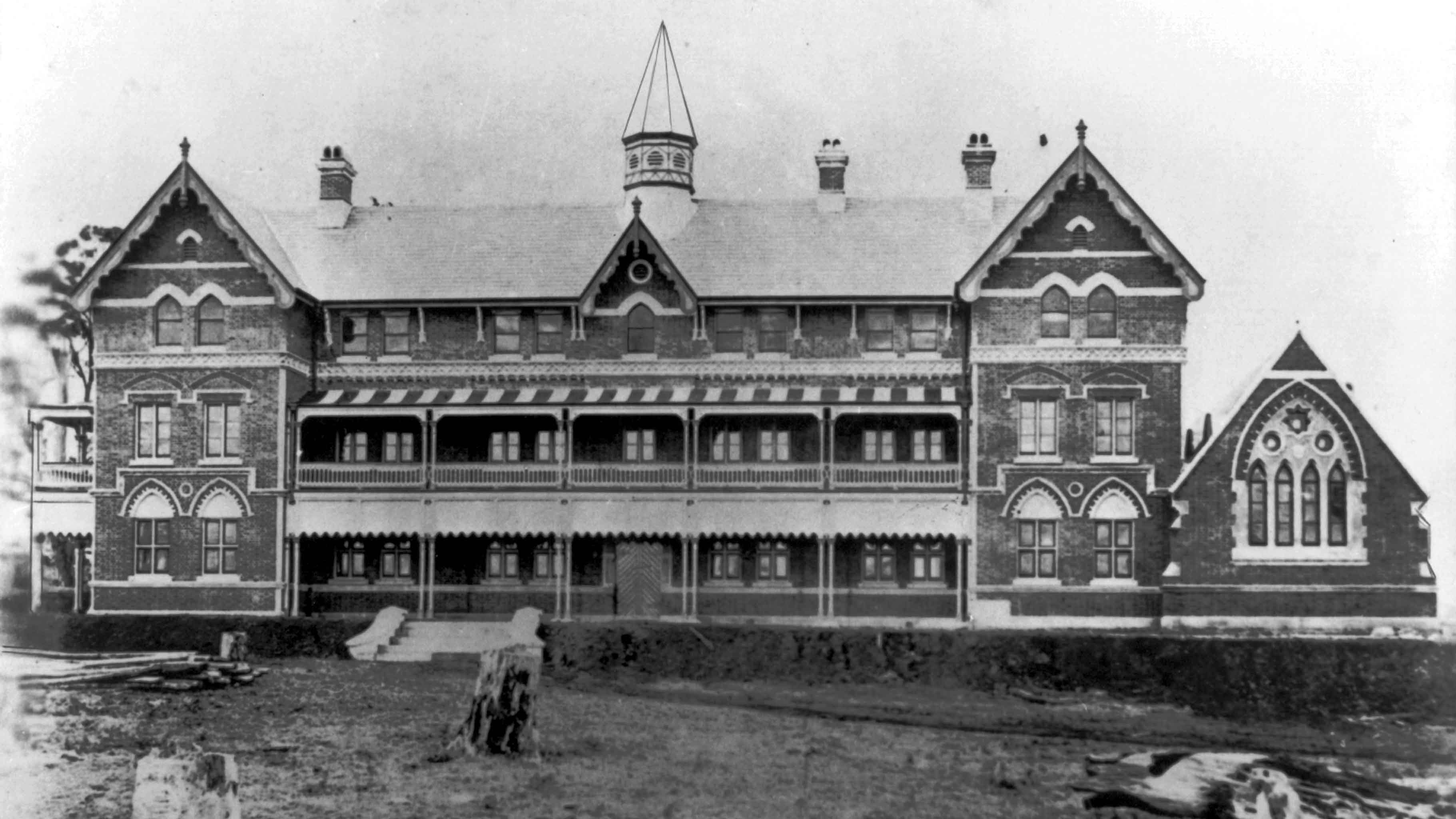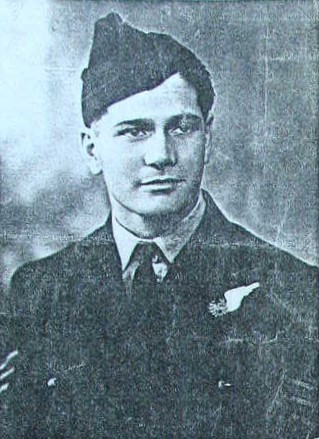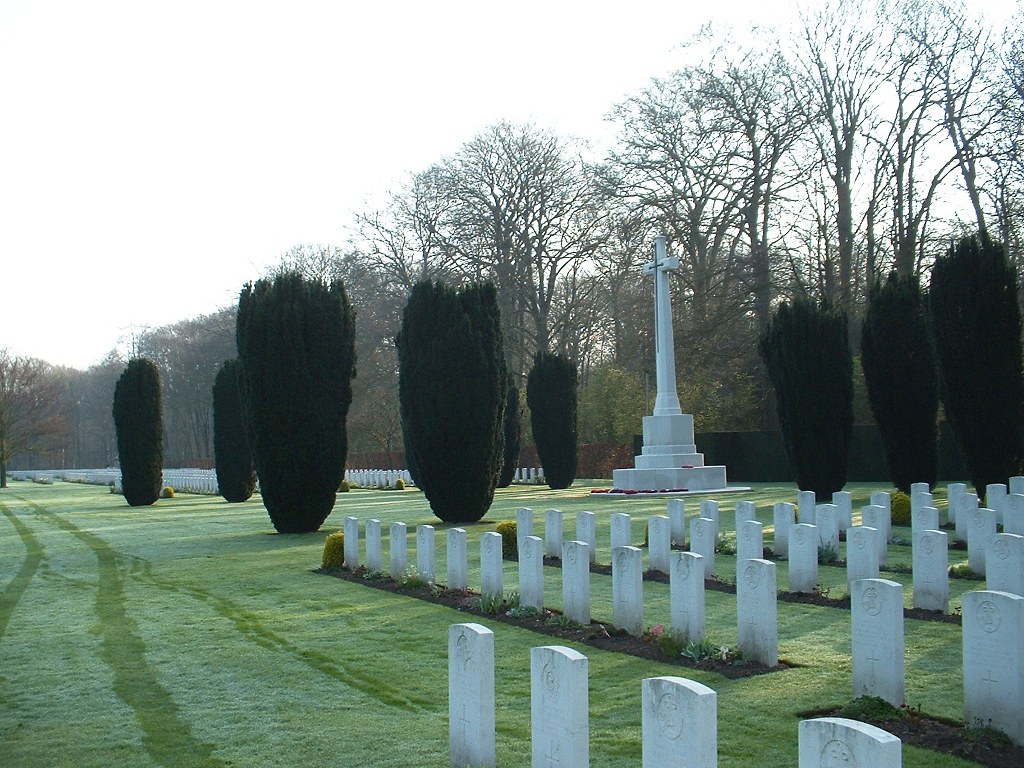Flight Sergeant Keith McGinn, the son of Charles Hume McGinn and Mona Margaret McGinn (nee Barrie), was born at Mackay in Queensland on 22nd January 1925. He was educated at the Mackay State High School during the years 1938 until 1940 and then attended the Toowoomba Grammar School during 1941 until 1942 where he completed the Senior Public Examination. Whilst a student at the Toowoomba Grammar School he served as an Acting Lieutenant in the Cadet Corps. He was also a member of the Air Training Corps. He applied for aircrew training in the Royal Australian Air Force on 9th December 1942.
Flight Sergeant Keith McGinn, at the age or was enlisted in the Citizen Air Force of the R.A.A.F. on 4th February 1943 at No. 3 Recruiting Centre in Brisbane after giving a commitment that he would serve for the duration of the war and an additional twelve months. He was allotted the service number of 435018. His physical description at the time of enlistment was that he was five feet eight inches in height and weighed 143 pounds. He had a dark complexion, hazel eyes and dark brown hair. He stated that he was of the Presbyterian religion. He gave his next of kin as his father Mr Charles H. McGinn, residing at 44 George Street, Mackay, Queensland.
Flight Sergeant Keith McGinn joined No. 3 Initial Training School at Kingaroy in Queensland on 27th February 1943. He joined No. 3 Wireless & Gunnery School at Maryborough in Queensland on 29th April 1943. He joined No. 1 Bombing & Gunnery School at Evans Head in New South Wales on 18th October 1943. He was remustered as a Wireless Operator/Air Gunner and promoted to the rank of Temporary Sergeant on 11th November 1943. He joined No. 2 Embarkation Depot at Bradfield Park in New South Wales on 12th November 1943 to prepare for movement overseas on attachment to the Royal Air Force. He embarked from Sydney in New South Wales on 12th December 1943 and disembarked in England on 26th January 1944. He joined No. 11 Personnel Despatch & Reception Centre on 27th January 1944.
Flight Sergeant Keith McGinn joined No. 4 (Observer) Advanced Flying Unit on 4th April 1944. He was promoted to the rank of Temporary Flight Sergeant on 4th May 1944. He joined No. 27 Operational Training Unit at Royal Air Force Station Lichfield for training in night bombing using Vickers Welligton aircraft on 23rd May 1944. He joined No. 11 Base at Royal Air Force Station Lindholme on 16th August 1944. He joined No. 103 Squadron Royal Air Force at Royal Air Force Station Elsham Wolds for operational duty on 29th October 1944.
He was reported missing during air operations over Dassau, Germany on 8th March 1945
For his service during World War 2, Keith McGinn was awarded the Air Gunner Qualification Badge, the 1939/1945 Star, the France & Germany Star, the Defence Medal, the War Medal and the Australian Service Medal 1939/1945. His headstone in the Reichswald Forest War Cemetery contains the family inscription “He Died That We May Live. Always Remembered”.
The following was published in a newspaper possibly the Mackay Newspaper:
News was received on Monday that Flight Sergeant Keith McGinn, son of Mr and Mrs Charles McGinn, of George Street, has been posted missing as the result of air operations over Europe. Keigh was trained in Canada and England. He was a member of a Lancaster crew which took part in wiping out the city of Dessau on the Elbe, 70 miles from Berlin, in concentrated raids on March 7 and 8. His Lancaster did not return from the raid on the 8th. Mr and Mrs McGinn are at present in Brisbane, where Mr McGinn, secretary of the Mackay Canegrowers’ Executive, is attending the Canegrowers” Conference. Keith, who is just 20, enlisted on completing his studies at the Toowoomba Grammar School about two years ago.
Flight Sergeant Keith Charles McGinn, eldest son of Mr and Mrs C.H. McGinn has been officially listed as killed in air operations over Germany on March 8, 1945. Flight Sergeant McGinn was born in Mackay on January 22, 1925, and passed his childhood days here. Educated at the Central, Intermediate and State High schools, he passed his Junior Public Examination in 1939, and in 1941 went to the Toowoomba Grammar School. Energetic and good-humoured, at Toowoomba he gained the same affection from his comrades and respect from his masters as he had earned in Mackay, and for two years (to the end of 1942) played a major part in the life of the school. He was a popular school prefect and won colors in both football and swimming. In the words of the Principal (Mr H.E. Roberts, MA), “He showed tact, courage and power and gave promise of developing into a strong leader of men”. Owing to the war, mainly inter-house football games were played, but notes in the Toowoomba Grammar School magazine referred to the “tank squadron” of forwards composed of McGinn and three others as members of the school’s best XV forwards, and when the school in the same year defeated Nudgee College on their own ground (for the second time only) by 19 to 10, credit was given to the hish standard shown by the Toowoomba forwards.
Keith matriculated in eight subjects in the Senior Public Examination in December 1942. It was his intention to take up civil engineering, he was a member of the Air Training Corps 58 Squadron at Toowoomba, and in February 1943 he joined the Royal Australian Air Force from Mackay. He received his training in Australia, and left for England in December 1943 as a sergeant in the first lot of aircrew under 19 years old to leave Australia. Although he travelled through America, he went straight on to England, passing his 19th birthday somewhere in the Atlantic and was posted to the R.A.F. Bomber Command as a wireless operator in aircrew flying Lancaster bombers. Sergeant McGinn took part in many air operations over Germany, ranging from the Baltic Sea to the Austrian border, and it was after the intense raids on Dessau on March 7 and 8 that he was posted missing, with a plane crew that he had joined because their own operator was sick. Brief hope flickered when it was learnt that Sergeant Bent, one of the crew, had reached England late in April, but inquiries revealed that Bent was one of two crewmen who had parachuted after the plane had caught fire near Freiburg area south of Dessau, who were not certain of the fate of their fellows.
On July 13 his parents were advised that Sergeant McGinn had been reclassified as having lost his life, the Air Ministry in London having received his identity card, together with advice from an Army source that it had been recovered from the body of a flight sergeant in the Freiburg area, in Southern Germany. No further official advice has been received, but Mr and Mrs McGinn have received from their son’s superior officers and friends in the RAF in England, letters testifying to the high regard in which he was held, and the bright promise of the young life so early extinguished in the service of his country.
Toowoomba Grammar School archives show that he started school on 31st January 1941 and left school on 27th November 1942. He was a member of the 1st Rugby team in 1941 and 1942 and also represented the school in Open swimming in 1942. He was also a prefect in 1942.




